ALAPP 2017: Aspects of Improving Quality in Professional Practice
CIRCD participated in the 7th International and interdisciplinary conference on Applied Linguistics and Professional Practice – the ALAPP Conference – in Ghent, November 2017.
The CIRCD researchers had a panel called Aspects on Improving Quality in Professional Practice and all papers that were presented here discussed opportunities and challenges connected to the collaboration between researchers and practitioners. Organizers were Gitte Gravengaard, Associate Professor, and Jeanette Landgrebe, Post Doc, from CIRCD at the University of Copenhagen.
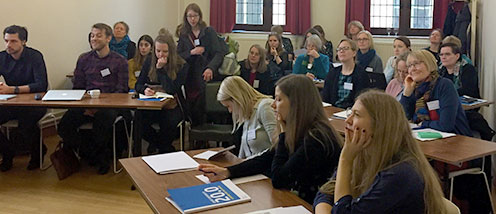
We had a large audience for this panel and they initiated very relevant discussions on how to create a knowledge-creating relationship between researchers and practitioners and how to collaborate in the best way possible.
Below you can see the program for this CIRCD panel and read all abstracts from the panel.
Program
- Introduction to the panel
Jeanette Landgrebe, Post Doc, University of Copenhagen - Collaboration between researchers and practitioners - three paradigms within communication research
Gitte Gravengaard, Associate Professor, University of Copenhagen - Facilitator resources for securing learning in video-based workshops
Brian Due, Assistant Professor, University of Copenhagen
Simon Bierring Lange, PhD Fellow, University of Copenhagen - The diversity management of team leaders in ’whiteboard meetings’ at a laundry factory
Louise Tranekjær, Associate Professor, University of Roskilde - Achieving professional identity while talking about improving professional practice and procedure
Mie Femø Nielsen, Professor, University of Copenhagen
Brian Due, Assistant Professor, University of Copenhagen
Louise Tranekjær, Associate Professor, University of Roskilde - Can we identify measurable trainables in social interaction?
Ann Merrit Rikke Nielsen, PhD Fellow, University of Copenhagen
Mie Femø Nielsen, Professor, University of Copenhagen - Balancing interest in fieldwork – research, teaching and multiple stakeholders
Jeanette Landgrebe, Post Doc, University of Copenhagen
Gitte Gravengaard, Associate Professor, University of Copenhagen
Introduction to the panel: Aspects of improving quality in professional practice
Organizers: Gitte Gravengaard, Associate Professor, University of Copenhagen, Jeanette Landgrebe, Post Doc, University of Copenhagen
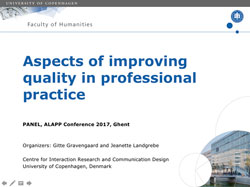 Drawing on theory from communication consultancy, change communication, learning theory, and metrology and framed within an ethnomethodological perspective, this panel discusses important aspects of the relation and collaboration between researchers and practitioners – and how this can improve and enhance the quality of professional practice.
Drawing on theory from communication consultancy, change communication, learning theory, and metrology and framed within an ethnomethodological perspective, this panel discusses important aspects of the relation and collaboration between researchers and practitioners – and how this can improve and enhance the quality of professional practice.
The panel will be grounded in empirical data as well as thoroughly reflected from theoretical perspectives as we discuss this collaboration from theoretical as well as practical angles.
All panel contributions will elaborate on potential pitfalls and benefits connected with applied research aiming at improving professional practice, and drawing on the new research value chain, we will demonstrate and discuss a range of examples of how we as scholars can engage with practitioners in a knowledge-creating relation; engaging in ongoing dialogue, discussing conclusions and findings, and developing tools for improving the professional practice.
We will suggest a framework identifying three paradigms for knowledge creation involving researchers and practitioners. In particular, we will show examples of how microanalysis of interaction in professional practice can be used to improve the quality of this particular practice – for instance, function as a point of departure for video learning workshops or the development of training programs. We will also address the challenges of assessing and measuring the efficiency of a particular interactional practice as a result of training or researcher intervention. Furthermore, we will elaborate on and discuss how to engage students in this type of project and how to balance the challenges connected to working with different interests and stakeholders during fieldwork.
All the contributions are to explain and discuss the co-construction of shared understanding and a shared language in applied research with the ambition to facilitate the creation of knowledge between specialized domains, thus creating a more public scholarship.
Collaboration between researchers and practitioners - three paradigms within communication research
Gitte Gravengaard, Associate Professor, University of Copenhagen, Denmark
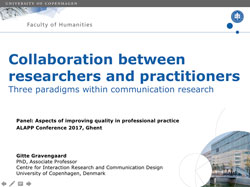 Drawing on examples from communication research, communication consultancy and a range of projects aimed at facilitating collaboration between researchers and practitioners, this paper identifies three paradigms (Kuhn 1962) in which knowledge, knowledge sharing, knowledge transformation, and knowledge creation are conceptualised and put into practice by researchers in different ways (Gravengaard 2017).
Drawing on examples from communication research, communication consultancy and a range of projects aimed at facilitating collaboration between researchers and practitioners, this paper identifies three paradigms (Kuhn 1962) in which knowledge, knowledge sharing, knowledge transformation, and knowledge creation are conceptualised and put into practice by researchers in different ways (Gravengaard 2017).
In paradigm 1, the expert consultant and top-down dissemination of knowledge, the researchers’ goal is to collect knowledge and make it available to those practitioners who might be interested. In this phase, we see projects drawing on the traditional research value chain, and a linguistic turn causes communication researchers to focus on the linguistic level of texts from organizations.
In paradigm 2, the expert consultant and top-down dissemination with feedback, knowledge transformation is conceptualised as a social process of sharing and exchanging knowledge within a social context (Blackler 1995). Still employing the traditional research value chain, a social turn now causes communication researchers to focus on the text in their organizational context refraining from focusing merely on the autonomous text.
The researchers’ main focus in paradigm 3, the facilitator and co-creation of knowledge, is to actively collaborate with practitioners and to create new knowledge and expand understanding together. The goal is knowledge development (Huysman & Wit 2002), by which knowledge creation is a joint endeavour involving both practitioners and researchers. Here, researchers conceptualise the relationship between practitioners and researchers as a knowledge-creating relation where both parties have important knowledge which is equally relevant – applying the new research value chain. This interactional turn conceptualizing communication as constitutive (Holtzhausen & Zerfass 2015) causes communication researchers to focus on all interactions in organizations when aiming at improving quality in professional practice.
A fourth paradigm, involving a (big) data turn, artificial intelligence, data mining, human-machine interaction and actor-network theory (Latour 1998, 2005), is prevailing, and this paper also discusses the contours of this new phase and the relation between researchers and practitioners prevalent here.
Facilitator resources for securing learning in video-based workshops
Brian Due, Assistant Professor, University of Copenhagen
Simon Bierring Lange, PhD Fellow, University of Copenhagen
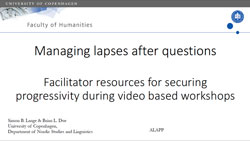 This paper reports on a longitudinal research project where we have been developing new methods for improving professional communication (Due & Lange, 2015).
This paper reports on a longitudinal research project where we have been developing new methods for improving professional communication (Due & Lange, 2015).
The problem we address is how to secure organizational learning for employees in video-based workshops. From an applied EMCA (Antaki, 2011) and multimodal (Streeck, Goodwin, & LeBaron, 2011) perspective, we have video recorded meetings and institutional interactions, analyzed details displayed in social interaction and presented findings video clips of this interaction in a workshop format to participants based on video clips. This is conducted in a workshop format to secure learning.
We have been working with four different Danish organizations; a large company, an NGO, a small software company and a large optician chain store where staff where attended video learning workshops. These workshops were video recorded and constitute the data for this paper. The data consists of video recordings of social interaction and field notes. In this paper, we specifically focus on the challenges of being a facilitator, and the semiotic resources the facilitator uses to secure progressivity in the video-based workshops.
The research has implications for practitioners, learning theories and multimodal interaction analysis.
The diversity management of team leaders in ’whiteboard meetings’ at a laundry factory
Louise Tranekjær, Associate Professor, University of Roskilde
This paper explores the strategies of Danish team leaders for inviting response and engagement from employees in a laundry factory where 80 per cent are second-language speakers of Danish.
Focusing on ‘whiteboard’ meetings, which are weekly factory assemblies between team leaders and employees the study builds on existing knowledge about institutional interactions as characterized by routinized practices and activity types (Levinson, 1992), goal orientation and participation frameworks (Goffman, 1981) that involve an asymmetric distribution of rights and roles (Drew and Heritage, 1992).
Given that issues related to understanding and the establishment of intersubjectivity are central in these meetings, the study furthermore builds on previous studies that illuminate the particular characteristics and strategies found in second language talk and atypical interactions (Gardner and Wagner, 2004; Rasmussen, 2016; Drew and Penn, 2016, Brown, 2003).
The central claim of this paper is that team leaders employ and ‘test’ a variety of strategies for inviting participation, response and confirmation of understanding from the employees and that such strategies can be described in terms of their relative success and employed for training purposes. The research questions are: A) What patterns present themselves in terms of successful strategies for inviting participation and response from employees? B) To what extent do these strategies involve an orientation towards the various linguistic and cultural backgrounds of the employees?
The data used for this study is video recordings of white-board meetings in four different teams with four different team leaders at a laundry factory in Denmark, focusing on sequences in which team leaders explicitly invite the response or participation of employees.
The study will contribute to the latest developments in interaction-based methods of language teaching and communication training such as CARM (Stokoe, 2014; Wagner, 2015).
Achieving professional identity while talking about improving professional practice and procedure
Mie Femø Nielsen, Professor, University of Copenhagen
Brian Due, Assistant Professor, University of Copenhagen
Louise Tranekjær, Associate Professor, University of Roskilde
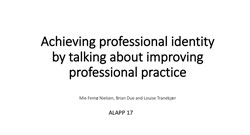 This paper claims that professionals’ thematization of improvement of professional practices or procedures is not merely a matter of improving the practice alone but also involves situated identity work. An example could be a team meeting where an employee for example says: We should use our intranet in smarter ways by doing” which both thematize improving professional practice and procedure while at the same time accomplishing a situated professional identity.
This paper claims that professionals’ thematization of improvement of professional practices or procedures is not merely a matter of improving the practice alone but also involves situated identity work. An example could be a team meeting where an employee for example says: We should use our intranet in smarter ways by doing” which both thematize improving professional practice and procedure while at the same time accomplishing a situated professional identity.
In this paper, we are interested in exploring members' recurrent and systematic multimodal resources for achieving professional identities about their talk about improving professional practice and procedure and to what extent recipients enable or challenge such identity work through situated practices.
This research relates to the work done within institutional interaction, focusing on e.g. goal orientation, asymmetry and formality (Drew & Heritage 1992: 47ff). The invoking of the procedure is an important feature of institutional interaction, employed to deal with e.g. asymmetries and negotiate procedures (Nielsen et al., 2012), and it also involves the achievement and maintenance of situational professional identities (Zimmerman, 1998; Tranekjær, 2015).
Data collected include video recordings of face-to-face and video-mediated institutional interaction in multiple institutional settings. Multimodal conversation analysis is used for the analysis.
The study contributes insights into the role of identity work in the achievement of institutionality and procedure within institutional interaction.
Can we identify measurable trainables in social interaction?
Ann Merrit Rikke Nielsen, PhD Fellow, University of Copenhagen
Mie Femø Nielsen, Professor, University of Copenhagen
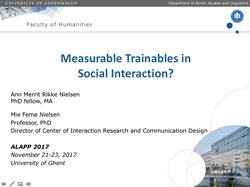 This paper addresses the problem of properly measuring the quality of the interactions that make up social processes. When training professionals’ interactional or communicative skills the goal is to enhance or improve the quality of something intangible, making assessing or measuring whether they are improved, and if so, to what degree, a real challenge. Instead, statements of perceived improvement of the outcome of the process are often used as evidence of the enhanced quality of the process itself.
This paper addresses the problem of properly measuring the quality of the interactions that make up social processes. When training professionals’ interactional or communicative skills the goal is to enhance or improve the quality of something intangible, making assessing or measuring whether they are improved, and if so, to what degree, a real challenge. Instead, statements of perceived improvement of the outcome of the process are often used as evidence of the enhanced quality of the process itself.
Measuring intangible concepts is a strong and longstanding tradition within psychology and social sciences (Coombs 1950, 1953; Rasch 1961; Bartholomew 1996). The humanities do however not have a strong tradition for measuring results or outcomes; few have attempted to measure social interaction (McCroskey & Wright) or communication (Schegloff 1993; Stivers 2015) and for good reason. However, our central claim is that eventually being able to measure the quality of social processes is doable and an endeavour worth pursuing.
Using several methodological approaches from the above domains, this paper aims to lay the foundation for and address the challenges associated with, developing a method to measure social interaction. Our study is based on a video ethnography of institutional data (e.g. meetings, workshops, service encounters) within an EMCA frame.
Creating a method to measure not just the interlocutors’ reflected perception of their interaction, but the social interaction itself would enable both researchers and practitioners to evaluate training programmes much better and hence facilitate improvement of the training.
Furthermore, it would allow for a validated assessment of the social processes that the interaction facilitates, which would be of interest to providers of public service and policymakers. This research thus has implications for both practitioners and researchers aiming to assess or evaluate the quality of social processes.
Balancing interest in fieldwork – research, teaching and multiple stakeholders
Jeanette Landgrebe, Post Doc, University of Copenhagen (first author)
Gitte Gravengaard, Associate Professor, University of Copenhagen (second author)
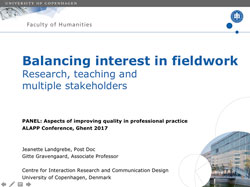 Taking the point of departure in Schön’s notion of the reflective practitioner (Schön 1982), Kolb’s approach to the experience-based learning process (Kolb 1984), and flipped classroom as a learning model (Alvarez 2011), this paper addresses and discusses challenges in teaching-based research. In particular, we focus on the challenges of balancing different interests of stakeholders during fieldwork when applying the new research value chain to facilitate a knowledge-creating relation (Gravengaard 2017) between stakeholders in such research projects.
Taking the point of departure in Schön’s notion of the reflective practitioner (Schön 1982), Kolb’s approach to the experience-based learning process (Kolb 1984), and flipped classroom as a learning model (Alvarez 2011), this paper addresses and discusses challenges in teaching-based research. In particular, we focus on the challenges of balancing different interests of stakeholders during fieldwork when applying the new research value chain to facilitate a knowledge-creating relation (Gravengaard 2017) between stakeholders in such research projects.
Practitioners, researchers and students invariably have different motivations for engaging in fieldwork; practitioners agree to be subjected to research, because of an interest in improving some aspects of their organization. Students engage in fieldwork as part of a curriculum and ultimately because they will face exam requirements. Researchers are interested in collecting data and gaining knowledge about a certain setting for the purposes of conducting research and improving organizational practices.
This triangle is a source of innovation and knowledge creation. However, the different interests may also lead to unforeseen clashes during the process of fieldwork, which may be rooted in the (mis)alignment between professional identities (Zimmerman 1998) and personal agendas.
Our primary data stems from our first-hand experience teaching a methodology course at the University of Copenhagen for three years. Here we combine the theoretical aspects of teaching methodology with practical experiences for the students involved, as we collaborate with organizations. Our method is autoethnography combined with other observation methods and various types of interviews with all stakeholders involved.
By combining the analysis of data with the overall theoretical framework for this paper, we identify and discuss several challenges in balancing interests in teaching-based research, and we suggest alternative strategies and courses of action (best practice) balance.
